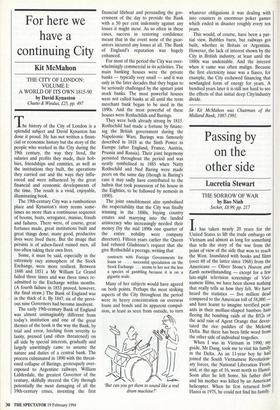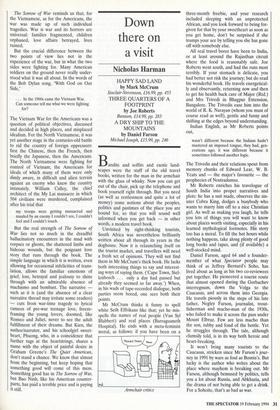Passing by on the other side
Lucretia Stewart
THE SORROW OF WAR by Bao Ninh Secker, £8.99, pp. 217 It has taken nearly 20 years for the United States to lift the trade embargo on Vietnam and almost as long for something that tells the story of the war from the point of view of the side that won to reach the West. Inundated with books and films (over 60 of the latter since 1968) from the Americans — Oliver Stone's Heaven and Earth notwithstanding — except for a few late-night television screenings of Viet- namese films, we have been shown nothing that really tells us how they felt. We have heard the statistics — five million dead compared to the American toll of 58,000 and have learnt to imagine terrified peas- ants in their mollusc-shaped bamboo hats fleeing the bombing raids of the B52s or the acid rain of Agent Orange that devas- tated the rice paddies of the Mekong Delta. But there has been little word from the other side of individual tragedies.
When I was in Vietnam in 1990, my guide, Mr Dang, took me to visit his family in the Delta. As an 11-year boy he had joined the South Vietnamese Revolution- ary forces, the National Liberation Front, and, at the age of 16, went north to Hanoi. Soon after he left home, his father died and his mother was killed by an American helicopter. When he first returned from Hanoi in 1975, he could not find his family. The Sorrow of War reminds us that, for the Vietnamese, as for the Americans, the war was made up of such individual tragedies. War is war and its horrors are universal: families fragmented, children orphaned, love affairs betrayed, lives ruined.
But the crucial difference between the two points of view lies not in the experience of the war, but in what the two sides were fighting for. Many American soldiers on the ground never really under- stood what it was all about. In the words of the Bob Dylan song, 'With God on Our Side,'
. In the 1960s came the Vietnam War. Can someone tell me what we were fighting for?
The Vietnam War for the Americans was a question of political objectives, discussed and decided in high places, and misplaced idealism. For the North Vietnamese, it was yet another stage in the centuries-old battle to rid the country of foreign oppressors: first the Chinese, then the French, then briefly the Japanese, then the Americans. The North Vietnamese were fighting for control of Vietnam; the Americans for ideals of which many of them were only dimly aware, in difficult and alien terrain against an enemy who knew the country intimately. William Calley, the chief architect of the My Lai massacre in which 504 civilians were murdered, complained after his trial that
my troops were getting massacred and mauled by an enemy I couldn't see, I couldn't feel and I couldn't touch.
But the real strength of The Sorrow of War lies not so much in the dreadful hallucinatory encounters in the mud with corpses or ghosts, the shattered limbs and hideous wounds, but the poignant love story that runs through the book. The simple language in which it is written, even allowing for occasional infelicities of trans- lation, allows the familiar emotions of grief, loss, betrayal and jealousy to shine through with an admirable absence of machismo and bombast. The narrative such as it is (and the absence of a clear narrative thread may irritate some readers) — cuts from war-time tragedy to lyrical cameos of pre-war teenage love, freeze- framing the young lovers, doomed, like Romeo and Juliet, never to see the adult fulfillment of their dreams. But Kien, the author/narrator, and his schoolgirl sweet- heart; Phuong, who, in a coincidence that further tugs at the heartstrings, shares a name with the object of painful desire in Graham Greene's The Quiet American, don't stand a chance. We know that almost from the beginning, but keep hoping that something good will come of this mess. Something good has in The Sorrow of War, but Bao Ninh, like his American counter- parts, has paid a terrible price and is paying it still.



















































 Previous page
Previous page